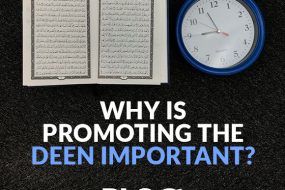
A perfect world: Every man’s dream.
Allah ![]() promises us this perfect world and tells us about “….a garden as wide as the heavens and earth, prepared for the righteous” (Surah Ale Imran 3:133)
promises us this perfect world and tells us about “….a garden as wide as the heavens and earth, prepared for the righteous” (Surah Ale Imran 3:133)
Our merciful Lord tells us the characteristics we need to reach this splendid place, in the next verse:
“Who spend [in the cause of Allah ] during ease and hardship and who restrain anger and who pardon the people – and Allah loves the doers of good,” (Surah Ale Imran 3 :134)
But we need to be aware of Shaitan and his tricks which are aimed at us falling short of being the people of Paradise. Let’s see what they are and what tricks shaitan can play on us:
1. “…spend [in the cause of Allah ] during ease and hardship…” 3:134
The primary context that comes to our mind when we read this verse is our wealth. But, Allah ![]() wants us to think more deeply as He uses the word “anfaq (spend)” in this verse and not “amwaal (wealth)” here.
wants us to think more deeply as He uses the word “anfaq (spend)” in this verse and not “amwaal (wealth)” here.
Our time, resources, intelligence, beneficial knowledge and good manners are all a part of our provision from Allah ![]() .
.
When we have the time, we visit the sick, are cordial to people, share the news of deals in the market, but when we are pressed for time, or going through a tough period in our lives, what do we do? We stop calling people and/or get irritable. When we feel that the sales are few, we don’t share the news with others, lest we lose out on the good stuff.
How much time, money or resources would we lose in making a quick call, or dropping a message or smiling even while rushing? A warm quick hug, donuts for the kids, sharing just one useful information on Facebook, putting one dollar instead of 5 in the donation box doesn’t cost much.
We must constantly strive to ‘spend” of our provisions as “the most beloved of deeds to him was a righteous deed which a person persists in doing, even if it is something small.”(Ibn Majah : Vol. 1, Book 37, Hadith 4237)
But shaitan tricks us by trying his best to delude us by painting the false picture of poverty (Surah Baqarah 2:268), or by trying to worry us about losing precious time.
Allah ![]() calls spending in His way a “loan to Him”, and He says, ” Who is it that would loan Allah a goodly loan so He may multiply it for him many times over? And it is Allah who withholds and grants abundance, and to Him you will be returned.” (Surah Baqarah 2:245)
calls spending in His way a “loan to Him”, and He says, ” Who is it that would loan Allah a goodly loan so He may multiply it for him many times over? And it is Allah who withholds and grants abundance, and to Him you will be returned.” (Surah Baqarah 2:245)
2.“…restrain anger… ” 3:134
To understand the depth of this characteristic, let’s see what these words in Arabic mean.
“Kazim” literally means to suppress some thing, to close the mouth of a water container and “Ghaiz” means to express an anger in which the blood pressure shoots up. How do we feel the surge of heat when some one made a belittling remark at us, or when some one quickly parked in our spot for which we had been patiently waiting, or when our children just don’t seem to clean up or our spouse seems inconsiderate?
There are three levels of “anger” with the lowest ranging from, just giving a “look”, to the moderate one being not smiling. Snapping back in retaliation , banging doors, yelling, stamping feet, etc. are grouped under the highest level. Bitter words escape our mouth and wrongful actions are done by our limbs. In the end, all that is left to gain is deep regret.
Shaitan does not want us to control our anger. He strokes our ego and fuels our emotions, so that we, instead of letting go of that remark, snap back in anger. Instead of moving on in that hurtful situation, we stay and fume, sometimes planning our revenge in anger, wasting both our time and energy.
But what does Allah ![]() want us to do at this time?
want us to do at this time?
Allah ![]() wants us hold it, as His messenger (ﷺ) said, “The strong is not the one who overcomes the people by his strength, but the strong is the one who controls himself while in anger.” (Sahih al-Bukhari :Book 78, Hadith 141)
wants us hold it, as His messenger (ﷺ) said, “The strong is not the one who overcomes the people by his strength, but the strong is the one who controls himself while in anger.” (Sahih al-Bukhari :Book 78, Hadith 141)
There is no sip greater in reward near Allah than the sip of anger; the servant suppresses it seeking the pleasure of Allah.” (Ibn Majah).
3. “…who pardon the people…” – 3:134
“Afeen” in the Arabic language is made up of the huroof, win, fa, wow.
These words mean to obliterate without any traces, to forgo, to forgive. We see a beautiful selection of words by Allah ![]() here again. He
here again. He ![]() doesn’t use the word “ghafireen” which means to “protect, cover over, hide, forgive.” And forgiveness in the English language means “the act of escaping a mistake or offense”. He
doesn’t use the word “ghafireen” which means to “protect, cover over, hide, forgive.” And forgiveness in the English language means “the act of escaping a mistake or offense”. He ![]() instead uses the word “afeen.”
instead uses the word “afeen.”
The difference between the two Arabic words powerfully impacts the act of the forgiveness.
Allah ![]() wants us not to just forgive, but to forgive in a manner that obliterates all traces of the incident in our minds, so that we don’t hold any ill feelings in our hearts for the people who have been unjust to us.
wants us not to just forgive, but to forgive in a manner that obliterates all traces of the incident in our minds, so that we don’t hold any ill feelings in our hearts for the people who have been unjust to us.
Allah ![]() warns us that “…Indeed, Satan induces [dissension] among them. Indeed Satan is ever, to mankind, a clear enemy.” (Surah Al Isra :53)
warns us that “…Indeed, Satan induces [dissension] among them. Indeed Satan is ever, to mankind, a clear enemy.” (Surah Al Isra :53)
Shaitan, will try to fuel our emotions of hurt, anger, sorrow by reminding us about the incident again and again.
The key lies in consciously forgiving the person, doing one’s best not to let oneself dwell in that incident and instead, focus on the reward that one gets for doing this.
“..and let them pardon and overlook. Would you not like that Allah should forgive you? And Allah is Forgiving and Merciful.” (Surah An Nur: 22)
Allah ![]() loves those people who forgive and He forgives them their sins. What can be better than His love and His forgiveness?
loves those people who forgive and He forgives them their sins. What can be better than His love and His forgiveness?
What we have to contemplate about is, “what is more valuable to us? His love and forgiveness Or our anger and revenge”?
If the former is more precious to us, then it is inconsequential whether the person deserves our anger and pardon or not.
“Our Lord, forgive us our sins and the excess [committed] in our affairs and plant firmly our feet and give us victory over the disbelieving people.” 3:147
May Allah ![]() make us steadfast upon this deen and help us inculcate the words from His Glorious Book in our day-to- day lives. Ameen
make us steadfast upon this deen and help us inculcate the words from His Glorious Book in our day-to- day lives. Ameen








3 replies on “Characteristics of the People of Paradise”
What a great explanation of all those three characteristics which Allah wants from us… May Allah make us amongst those
[…] words or backbiting or slander.[1] Our dress/car/house/wealth/family status doesn’t define us. What we speak defines our character. So let’s tame our tongue this month. We can use our tongues to plant a seat in the everlasting […]
[…] or backbiting or slander.[1] Our dress/car/house/wealth/family status doesn’t define us. What we speak defines our character. So let’s tame our tongue this month. We can use our tongues to plant a seat in the everlasting […]